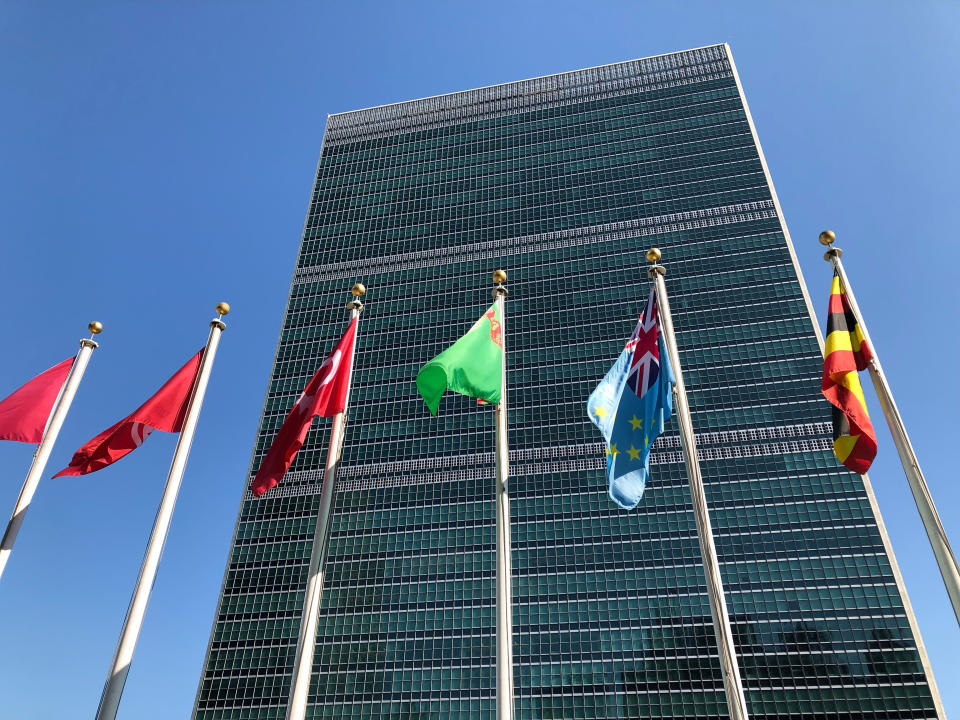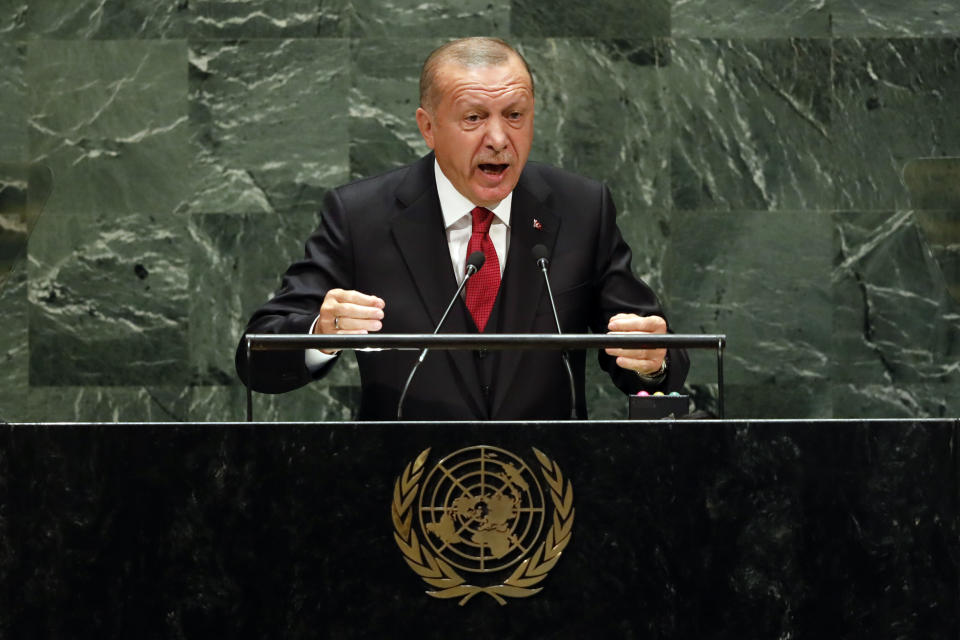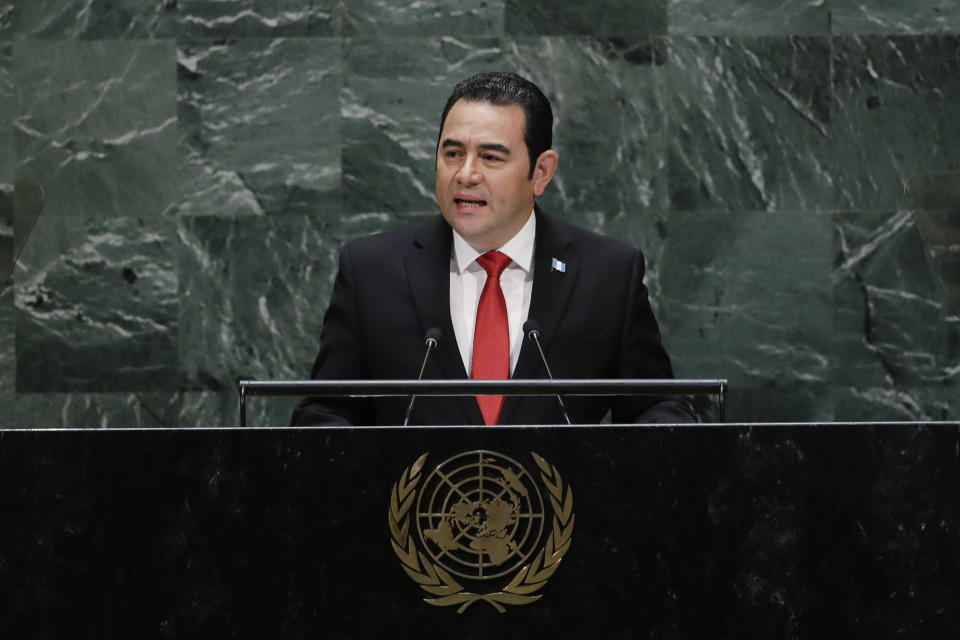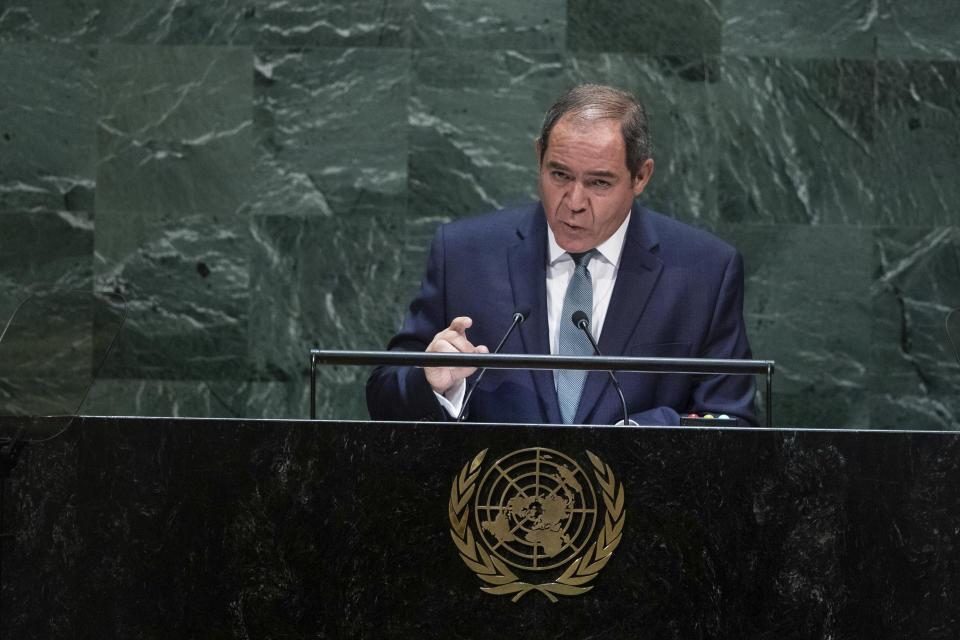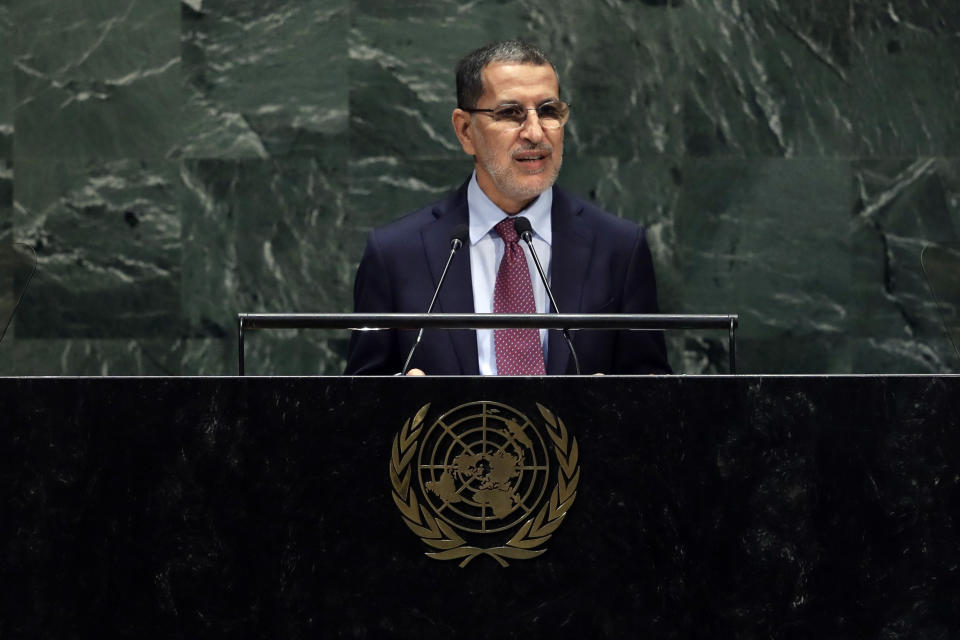UNITED NATIONS (AP) — The Middle East. Trade tensions. Iran's nuclear program. Venezuela's power struggle. Civil wars in Syria and Yemen. Familiar flash points such as these got plenty of airtime at the U.N. General Assembly's big annual gathering this week.
But some leaders used their time on the world stage to highlight international conflicts and disputes that don't usually command the same global attention.
A look at some of the less-discussed controversies trying to be heard:
___
NAGORNO-KARABAKH
Turkish President Tayyip Erdogan landed one of the coveted first few speaking slots, and he devoted a bit of his wide-ranging speech to a clash in the Caucasus: a standoff between Armenia and Azerbaijan over the Nagorno-Karabakh region.
The mountainous, ethnic Armenian area of about 150,000 people is recognized as part of Azerbaijan in U.N. Security Council resolutions dating to the 1990s. But Nagorno-Karabakh and some neighboring districts have been under the control of local ethnic Armenian forces, backed by Armenia, since a six-year separatist war ended in 1994.
Both Azerbaijan and Turkey have closed their borders with Armenia because of the conflict, cutting trade and leaving Armenia with direct land access only to Georgia and Iran.
Russia, the U.S. and France have co-chaired the so-called Minsk Group of the Organization for Security and Cooperation in Europe, attempting to broker an end to the Nagorno-Karabakh conflict.
At the General Assembly, Armenia and Azerbaijan accused one another of obstructing the path toward a peaceful settlement.
"No progress has been achieved" in the past year, Azerbaijani Foreign Minister Elmar Mammadyarov said Saturday, blaming "the apparent lack of genuine interest" on the Armenian side.
Days earlier, Armenian Prime Minister Nikol Pashinian complained that Azerbaijan's leaders "don't want to seek any compromise."
___
NORTH MACEDONIA
U.N. Secretary-General Antonio Guterres' "state of the world" address was largely a grim one , but he pointed to a few matters moving "in promising directions" — among them relations between Greece and the new Republic of North Macedonia.
Greece and what the U.N. cumbersomely used to call the "Former Yugoslav Republic of Macedonia" sparred for nearly three decades over the latter's name. It was adopted when the nation, which has a current population of about 2.1 million, declared independence from the former Yugoslavia in 1991.
Greece said the use of "Macedonia" implied territorial claims on its own northern province of the same name and its ancient Greek heritage, not least as the birthplace of ancient warrior king Alexander the Great. Athens blocked its Balkan neighbor's path to NATO and EU membership over the nomenclature clash.
It became "infamous as a difficult and irresolvable problem," in the words of now-North Macedonian Prime Minister Zoran Zaev.
Repeated rounds of U.N.-mediated negotiations proved fruitless until June 2018, when the Skopje government agreed to change the country's name to North Macedonia. The switch took effect this February.
European Council President Donald Tusk said this month that North Macedonia is now ready to start EU membership talks. It expects to become the 30th NATO member soon.
The deal has been contentious within both countries, though, with critics accusing their governments of giving up too much. Regardless, North Macedonia's prime minister highlighted it with pride from the world's premier diplomatic podium.
"We can see nothing but benefits from settling the difference," Zaev said, calling it "an example for overcoming difficult deadlocks worldwide."
Greek Prime Minister Kyriakos Mitsotakis didn't dilate on the deal, saying only that his country supports EU bids by all the western Balkan countries if they respect their obligations to the EU and their neighbors.
___
WESTERN SAHARA
A mostly desert expanse along the northwest coast of Africa, Western Sahara has been a center of friction between Morocco and Algeria for almost half a century.
Morocco annexed the phosphate- and fishing-rich former Spanish colony in 1975, then fought the Algerian-backed Polisario Front independence movement until 1991, when the U.N. brokered a cease-fire and established a peacekeeping mission to monitor the truce and facilitate a referendum on the territory's future.
The vote has never happened. Morocco has proposed wide-ranging autonomy for Western Sahara, while the Polisario Front insists that Western Sahara's Sahrawi people — a population the independence movement estimates at 350,000 to 500,000 — have the right to a referendum.
Last year, the U.N. Security Council called for stepping up efforts to reach a solution to the dispute.
A U.N. envoy brought representatives of Morocco, the Polisario Front, Algeria and neighboring Mauritania together last December for the first time in six years, followed by a second meeting in March. But the issue of how to provide for self-determination remains a key sticking point.
The envoy, former German President Horst Kohler, resigned in May for health reasons.
At the General Assembly, Moroccan Prime Minister Saad-Eddine El Othmani said his country's autonomy proposal "is the solution," while Algerian Foreign Minister Sabri Boukadoum reiterated hopes for Western Sahara residents "to be able to exercise their legitimate right to self-determination."
____
CYPRUS
A U.N.-controlled buffer zone that cuts across the city of Nicosia evinces a fraught distinction: Cyprus is the last European country to have a divided capital.
After 45 years, could that finally change? There's "a glimmer of hope," Cyprus President Nicos Anastasiades told to the assembly.
The eastern Mediterranean island has been split into an internationally recognized Greek Cypriot south and a breakaway Turkish Cypriot north since 1974, when Turkey invaded following a coup by supporters of uniting the island with Greece. Turkey continues to maintain more than 35,000 troops in the northern third of the island, which only Turkey recognizes as an independent state. The U.N. also has a peacekeeping force in Cyprus.
Tensions have ticked up lately, particularly over natural gas exploration in waters in the internationally recognized state's exclusive economic zone. Turkey is also drilling there, saying it's defending Turkish Cypriots' rights to energy reserves.
On-and-off talks about reunification have spanned decades.
Greek Cypriots have rejected Turkish Cypriots' demands for a permanent Turkish troop presence and veto power in government decisions in a future federated Cyprus. Turkish Cypriots, meanwhile, want parity in federal decision-making, believing they would otherwise be relegated to junior partners to the majority Greek Cypriots.
A U.N. envoy made a shuttle-diplomacy effort in recent weeks in hopes of paving the way for formal talks, and Anastasiades suggested in his General Assembly speech there was some agreement on starting points for potential discussion. But he also complained that Turkey's drilling and other activities "severely undermine" the prospect of negotiations.
Turkey's Erdogan, meanwhile, complained about "the uncompromising position" of the Greek Cypriots.
___
BELIZE-GUATEMALA
It's been a big year in a centuries-old argument between Belize and Guatemala.
Guatemala claims more than 4,000 square miles (10,350 square kilometers) of terrain administered by Belize — essentially the southern half of Belize. It's an area of nature reserves, scattered farming villages and fishing towns, and some Caribbean beach tourism destinations.
The dispute's roots stretch to the 19th century, when Britain controlled Belize and Spain ruled Guatemala.
Guatemala, which became independent in 1821, argues that it inherited a Spanish claim on the territory. Belize considers Guatemala's claim unfounded and says the borders were defined by an 1859 agreement between Guatemala and Britain (Belize remained a British colony until 1981).
The land spat has strained diplomatic relations and at times even affected air travel between the two Central American countries.
Belize and Guatemala agreed in 2008 to ask the International Court of Justice in The Hague, Netherlands, for a binding ruling. Guatemalans voters gave their assent to the plan in a referendum last year, and Belizeans gave their approval this May.
Guatemalan President Jimmy Morales celebrated the developments in his General Assembly speech.
"This is a milestone for Guatemala, for Central America and for the world," he said, emphasizing the peaceful process toward resolving the disagreement. "Currently, bilateral relations between Guatemala and Belize are the best they've ever been."
Belizean Foreign Minister Wilfred Elrington told the assembly Saturday that his country also looked forward to resolving "an age-old, atavistic claim that has hindered Belize's development" and undercut friendship between the countries.
"We in Belize certainly have the most fervent wish to live side by side with the government and people of Guatemala in peace, harmony and close cooperation," Elrington said.
But he said Belize remains concerned about various alleged activities by Guatemalan troops and citizens — drawing a bristling reply from Guatemala, which rejects those claims and said they belong in the court, not the big-picture U.N. gathering.
___
Jennifer Peltz is covering the U.N. General Assembly for The Associated Press. Follow her on Twitter at @jennpeltz.

